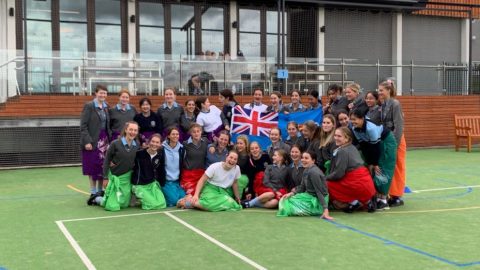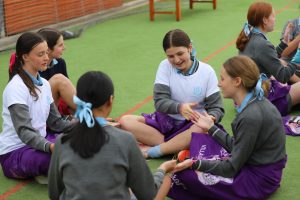Year 9 Update

Somehow we are in Term 4 – where has this year disappeared?
The Year 9 cohort hit the ground running this term with Fiji Day taking place on Thursday 10 October. This year is the first year where every eligible cohort in the Senior School have undertaken the Heyington to Highlands program. Fiji Day is an opportunity for students to connect through their experiences in the Fiji Highlands. Students across Years 9 to 12 wore their village sulus and played village games, ate donuts, cake and pineapple, and reminisced about their wonderful experience and the lessons learned from this excellent immersion.
As we have begun, so we have continued with the term racing forth with tests, assignments and the looming Semester 2 exams. These are scheduled to begin for the Year 9 students on Friday 8 November. In preparation for these exams, the Year 9 students will be discussing their study techniques and exam tips in Form. In particular, we will be reflecting on the experience of Semester 1 exams and discussing what strategies worked well, what needs improving and what requires a re-think. As always, students have access to study timetables and I am offering my time to work one-on-one with the students to help determine priorities and create a timetable that suits their learning styles and needs.
Key Tips For Preparing For Exams
- Remember that organised people do not have great memories, they write everything down. Use your diary, create a study chart and set reminders on your phone. Do not let anything slip through the cracks!
- Spread your time around. It is very easy to get stuck on one task, or studying for one subject, and not spend enough time on others. Set time limits and stick to them.
- Manage your distractions. Electronic devices can be VERY distracting. Limit your time on these devices and give yourself set times to use them. Schedule in your study timetable ‘device time’ as a reward for studying. For example, 45 minutes studying, 15 minutes device time.
- It does not matter where you study. So long as your space is quiet, comfortable and distraction free.
Creating a Study Timetable
- Mark in your fixed commitments. Family dinners, sport and co-curricular activities.
- Structure your study time when you work best. Straight after school or after dinner.
- Manage your study blocks. It is not realistic to study for 90 minutes straight. Give yourself a break! Pick a reward that works for you – food, technology or going for a run.
Revise Effectively
Do not just read over your notes because you will not be processing information.
- Summarise notes.
- Write key terms and examples.
- Create a concept map of the topic using diagrams and flow charts.
- Make cue/study cards for terms and include diagrams if need be.
- Use mnemonics such as acronyms or acrostics (Happy Healthy Little Bert Bought Car Number O Five Nine – these are the first 10 elements of the periodic table. I still remember this from when I was in Year 9!).
- Change lyrics to songs you like to add subject content (like English quotes).
- Use the ‘coach it’ style – teach the content to someone else, such as a friend, parent or stuffed toy.
- Write a booklet of questions and answers and swap with friends.
- Quiz yourself or ask your parents to quiz you.
- Speak aloud and discuss the content.
- Use resources such as Quizlet.
There are more techniques and tips on the Year 9 Portal page for students and parents to review and discuss. The most important thing is to realise you do not need to do it all, just do what works for you. Find out how best you study. Are you a visual person? Do you need to talk the content through with someone else? Do you prefer to create lists and palm cards? Figure it out and implement it!
Good luck to everyone and remember that if you are still unsure on how to approach this potentially daunting time, there is a WEALTH of knowledge sitting with Year 9 teachers. Please always ask.



